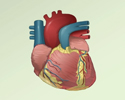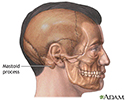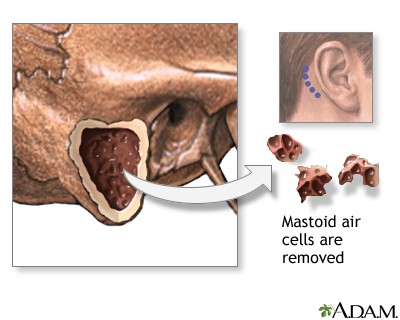Mastoidectomy
Simple mastoidectomy; Canal-wall-up mastoidectomy; Canal-wall-down mastoidectomy; Radical mastoidectomy; Modified radical mastoidectomy; Mastoid obliteration; Retrograde mastoidectomy; Mastoiditis - mastoidectomy; Cholesteatoma - mastoidectomy; Otitis media - mastoidectomyA mastoidectomy is surgery to remove cells in the hollow, air-filled spaces in the skull behind the ear within the mastoid bone. These spaces are called mastoid air cells.
Description
This surgery used to be a common way to treat an infection in mastoid air cells. In most cases, the condition was caused by an ear infection that spread to the bone in the skull. This surgery is not often performed now.
You will receive general anesthesia, so you will be asleep and pain free. The surgeon will make a cut behind the ear. A bone drill will be used to gain access to the middle ear cavity that is behind the mastoid bone in the skull. The infected parts of the mastoid bone or ear tissue will be removed and the cut is stitched and covered with a bandage. The surgeon may put a drain behind the ear to prevent fluid from collecting around the incision. The operation will take 2 to 3 hours.
Why the Procedure Is Performed
Mastoidectomy may be used to treat:
-
Cholesteatoma
Cholesteatoma
Cholesteatoma is a type of skin cyst that is located in the middle ear and mastoid bone in the skull.
 ImageRead Article Now Book Mark Article
ImageRead Article Now Book Mark Article - Complications of an ear infection (otitis media)
Otitis media
Chronic ear infection is fluid, swelling, or an infection behind the eardrum that does not go away or keeps coming back. It may cause long-term or p...
 ImageRead Article Now Book Mark Article
ImageRead Article Now Book Mark Article - Infections of the mastoid bone that do not get better with antibiotics
- To place a cochlear implant
Cochlear implant
A cochlear implant is a small electronic device that helps people hear. It can be used for people who are deaf or very hard of hearing.
 ImageRead Article Now Book Mark Article
ImageRead Article Now Book Mark Article
Risks
Risks may include:
- Changes in taste
- Dizziness
- Hearing loss
- Infection that persists or keeps returning
- Noises in the ear (tinnitus)
Tinnitus
Tinnitus is the medical term for "hearing" noises in your ears. It occurs when there is no outside source of the sounds. Tinnitus is often called "r...
 ImageRead Article Now Book Mark Article
ImageRead Article Now Book Mark Article - Weakness of the face
- Cerebrospinal fluid leak
Before the Procedure
Tell your surgeon or nurse if:
- You are or could be pregnant
- You are taking any medicines, including medicines, supplements, or herbs you bought without a prescription
- You have been drinking a lot of alcohol, more than 1 or 2 drinks a day
Planning for your surgery:
- If you have diabetes, heart disease, or other medical conditions, your surgeon may ask you to see your health care provider who treats you for these conditions.
Diabetes
Diabetes is a long-term (chronic) disease in which the body cannot regulate the amount of sugar in the blood.
 ImageRead Article Now Book Mark Article
ImageRead Article Now Book Mark ArticleHeart disease
Coronary heart disease is a narrowing of the blood vessels that supply blood and oxygen to the heart. Coronary heart disease (CHD) is also called co...
 ImageRead Article Now Book Mark Article
ImageRead Article Now Book Mark Article - If you smoke, it’s important to cut back or quit. Smoking can slow healing and increase the risk for blood clots. Ask your provider for help quitting smoking.
Smoking can slow healing and increase t...
Quitting smoking and other nicotine products, including e-cigarettes, before surgery can improve your recovery and outcome after surgery. Most people...
Read Article Now Book Mark ArticleQuitting smoking
There are many ways to quit smoking. There are also resources to help you. Family members, friends, and co-workers may be supportive. But to be su...
 ImageRead Article Now Book Mark Article
ImageRead Article Now Book Mark Article - If needed, prepare your home to make it easier to recover after surgery.
Prepare your home
Getting your home ready after you have been in the hospital often requires much preparation. Set up your home to make your life easier and safer when...
Read Article Now Book Mark Article - Ask your surgeon if you need to arrange to have someone drive you home after your surgery.
During the week before your surgery:
- You may be asked to temporarily stop taking medicines that keep your blood from clotting. These medicines are called blood thinners. This includes over-the-counter medicines and supplements such as aspirin, ibuprofen (Advil, Motrin), naproxen (Aleve, Naprosyn), and vitamin E. Many prescription medicines are also blood thinners.
- Ask your surgeon which medicines you should still take on the day of surgery.
- Let your surgeon know about any illness you may have before your surgery. This includes COVID-19, a cold, flu, fever, herpes breakout, or other illness. If you do get sick, your surgery may need to be postponed.
COVID-19
Coronavirus disease 2019 (COVID-19) is a respiratory illness that causes fever, coughing, and shortness of breath, but many other symptoms can occur....
 ImageRead Article Now Book Mark Article
ImageRead Article Now Book Mark ArticleCold
The common cold most often causes a runny nose, nasal congestion, and sneezing. You may also have a sore throat, cough, headache, or other symptoms....
 ImageRead Article Now Book Mark Article
ImageRead Article Now Book Mark ArticleFlu
The flu (influenza) is a viral respiratory illness that causes fever, chills, runny nose, body aches, and cough. It spreads easily from person to pe...
 ImageRead Article Now Book Mark Article
ImageRead Article Now Book Mark Article
On the day of surgery:
- Follow instructions about when to stop eating and drinking.
- Take the medicines your surgeon told you to take with a small sip of water.
- Follow instructions on when to arrive at the hospital. Be sure to arrive on time.
After the Procedure
You will have stitches behind your ear and there may be a small rubber drain. You may also have a large dressing over the operated ear. The dressing is removed the day after surgery. You may need to stay in the hospital overnight. Your provider will give you pain medicines and antibiotics to prevent infection.
Outlook (Prognosis)
Mastoidectomy successfully gets rid of the infection in the mastoid bone in most people.
References
Chole RA, Sharon JD. Chronic otitis media, mastoiditis, and petrositis. In: Flint PW, Francis HW, Haughey BH, et al, eds. Cummings Otolaryngology: Head and Neck Surgery. 7th ed. Philadelphia, PA: Elsevier; 2021:chap 140.
Kesser BW. Surgery of ventilation and mucosal disease. In: Brackmann DE, Shelton C, Arriaga MA, eds. Otologic Surgery. 5th ed. Philadelphia, PA: Elsevier; 2023:chap 5.
MacDonald CB, Wood JW. Mastoid surgery. In: Myers EN, Snyderman CH, eds. Operative Otolaryngology - Head and Neck Surgery. 3rd ed. Philadelphia, PA: Elsevier Saunders; 2018:chap 134.
Stevens SM, Lambert PR. Mastoidectomy: surgical techniques. In: Flint PW, Francis HW, Haughey BH, et al, eds. Cummings Otolaryngology: Head and Neck Surgery. 7th ed. Philadelphia, PA: Elsevier; 2021:chap 143.
Review Date: 9/30/2024
Reviewed By: Ashutosh Kacker, MD, FACS, Professor of Clinical Otolaryngology, Weill Cornell Medical College, and Attending Otolaryngologist, New York-Presbyterian Hospital, New York, NY. Review provided by VeriMed Healthcare Network. Also reviewed by David C. Dugdale, MD, Medical Director, Brenda Conaway, Editorial Director, and the A.D.A.M. Editorial team.





